Seals and Sea Lions: Coastal Viewing Tips

Observing seals and sea lions in their natural coastal habitats can be an awe-inspiring experience. However, it's crucial to approach these marine mammals responsibly to ensure their well-being and preserve their natural behaviors. Here are some essential tips for ethically viewing seals and sea lions along the coastline.
1. Maintain a Safe Distance
Always keep a minimum distance of 100 yards (about 90 meters) from seals and sea lions. This space helps prevent stress and allows the animals to behave naturally. Use binoculars or a zoom lens for a closer look without disturbing them.
2. Recognize Signs of Distress
Learn to identify signs that you're too close. If seals or sea lions start to look at you frequently, appear agitated, or begin moving towards the water, you're likely causing them stress. Slowly and quietly move away to give them more space.

3. Time Your Visit Wisely
Early mornings and late afternoons are often the best times for viewing, as many seals and sea lions haul out on beaches or rocks during these hours. However, avoid disturbing them during sensitive times like breeding or pupping seasons.
4. Use Designated Viewing Areas
Many popular seal and sea lion habitats have designated viewing platforms or areas. Stick to these spots to minimize your impact on the environment and the animals.
5. Keep Quiet and Move Slowly
Loud noises and sudden movements can startle these marine mammals. Speak softly and move slowly to avoid causing unnecessary stress or prompting them to flee into the water.

6. Never Feed the Animals
Feeding seals and sea lions is harmful and often illegal. It can lead to dependency on humans, alter their natural behaviors, and potentially cause health issues.
7. Be Aware of Local Regulations
Different areas may have specific rules regarding marine mammal viewing. Familiarize yourself with local guidelines and always follow park ranger or guide instructions.
8. Educate Others
If you see others behaving inappropriately around seals or sea lions, kindly inform them about proper viewing etiquette. Sharing knowledge helps protect these amazing creatures.
Remember:
Responsible wildlife viewing ensures that future generations can enjoy these magnificent marine mammals in their natural habitats. By following these guidelines, you're contributing to the conservation of seals, sea lions, and their coastal ecosystems.
